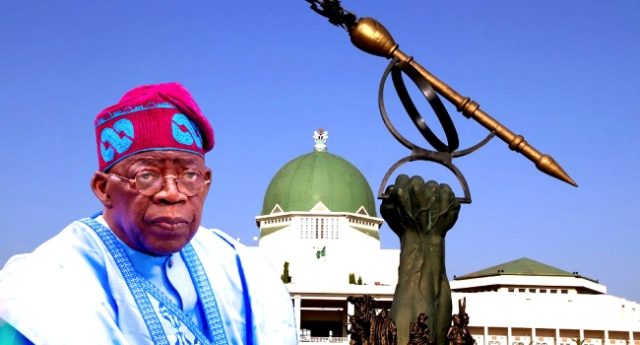Despite contrary views by some lawmakers, President Tinubu’s request to extend the 2023 Appropriation Act, and the supplementary budget got passed by the House of Representatives

At the resumed plenary of the House of Representatives on Thursday, lawmakers passed two money bills extending the implementation of the 2023 Appropriation Act and the 2023 Supplementary Appropriation Act until December 31, 2024.
Both bills scaled first, second and third reading at the floor of the House on Thursday.
This development followed President Bola Tinubu’s letter to the House seeking approval to further extend the implementation period for the capital component of the N21.83trn 2023 budget, and the N2.17trn 2023 supplementary budget from June 30 to December 31, 2024.
A mild drama ensued during debate of the bills which resulted into executive session as members became divided over the extension being sought by the President.
The House Majority Leader, Rep. Julius Ihonbvere (APC, Edo), while leading the debate for second reading, said the bill is a straightforward bill to provide for the completion of ongoing projects and strengthen the economy of Nigeria.
However, the Minority Leader, Rep. Kingsley Chinda (PDP Rivers) had a contrary view and noted that the 2023 supplementary budget had already been extended to December and that giving another extension will mean having three budgets running concurrently in the country.
He said though the process and procedure may be legal, it may not be morally correct to Nigerians. He therefore suggested that the bill be stepped down. Rep. Soli Sada (APC Katsina) and Rep. Alhassan Ado Doguwa (APC Kano) backed the minority leader but said the bill should be allowed to pass. This disagreement led the House to go into an executive session.
Upon return from the executive session, the lawmakers unanimously passed for second reading both money bills seeking extension of the budgets by President Tinubu. The House thereafter dissolved into the committee of supply to debate the various clauses in the money bills, all of which were carried. Subsequently, the House reverted to plenary where the bills were read for the third time.
Past Budgets passed
President Tinubu inherited a budget of N21.8 trillion from his predecessor, Muhammadu Buhari. Additionally, Tinubu inherited the N819 billion 2022 supplementary budget from the previous administration. In July 2023, the president submitted a proposal to the National Assembly to amend the N819 billion 2022 supplementary budget. This amendment included a N70 billion package for the National Assembly “meant for infrastructure’ and N500 billion for palliatives and other capital expenditures to mitigate the impact of the recent fuel subsidy removal. In October 2023, President Tinubu presented a N2.17 trillion supplementary budget for 2023 to the National Assembly for approval. According to the president, the majority of the budget’s provisions were aimed at addressing insecurity.
Previous amendments
The Acts were initially extended on 31 December 2023 for a period of three months, moving the deadline to 30 March 2024. Shortly before the new expiry date, the president requested another extension for the two budgets until 30 June 2024, which the lawmakers promptly approved. In the House, the bills passed through all three stages on the same day.
What is an appropriation act?
An appropriation act is a law that authorizes the expenditure of government funds. It authorises amounts to be issued from the public accounts and applied for services in a financial year A supplementary budget refers to a budget approved when the allocated revenue for government activities in a fiscal year is insufficient, when additional funding is needed for an unbudgeted government activity, or when the allocated expenditure for an activity is inadequate.
